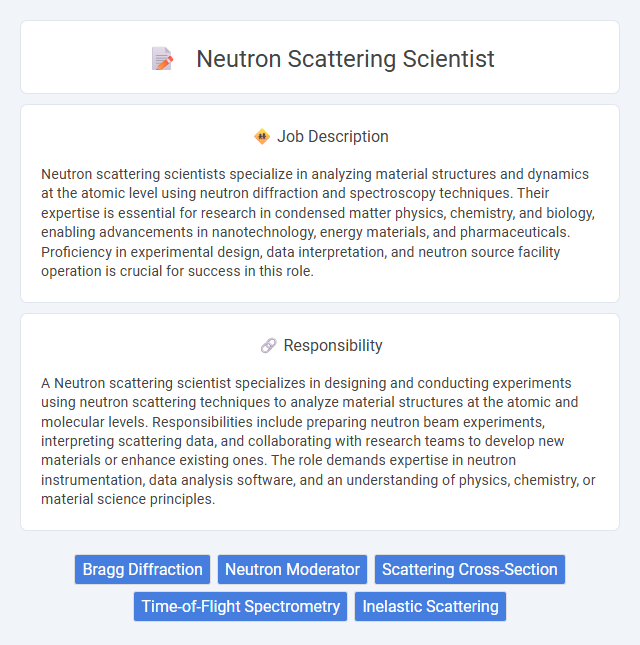
Neutron scattering scientists specialize in analyzing material structures and dynamics at the atomic level using neutron diffraction and spectroscopy techniques. Their expertise is essential for research in condensed matter physics, chemistry, and biology, enabling advancements in nanotechnology, energy materials, and pharmaceuticals. Proficiency in experimental design, data interpretation, and neutron source facility operation is crucial for success in this role.
Individuals with strong analytical skills and a passion for physics will likely find a neutron scattering scientist position suitable. The job may demand resilience in handling complex experiments and interpreting data under strict laboratory conditions. Those comfortable with collaborative research environments and adept at problem-solving might have a higher probability of thriving in this role.
Qualification
A neutron scattering scientist typically holds a Ph.D. in physics, materials science, or a related field with extensive expertise in neutron scattering techniques and data analysis. Proficiency in experimental design, spectroscopy, and the operation of neutron sources, such as research reactors or spallation sources, is essential. Strong analytical skills, programming experience for modeling and simulation, and a track record of scientific publications further enhance suitability for this role.
Responsibility
A Neutron scattering scientist specializes in designing and conducting experiments using neutron scattering techniques to analyze material structures at the atomic and molecular levels. Responsibilities include preparing neutron beam experiments, interpreting scattering data, and collaborating with research teams to develop new materials or enhance existing ones. The role demands expertise in neutron instrumentation, data analysis software, and an understanding of physics, chemistry, or material science principles.
Benefit
A career as a neutron scattering scientist likely offers access to cutting-edge research facilities and opportunities to contribute to advancements in materials science, physics, and chemistry. The position probably provides collaboration chances with interdisciplinary teams, enhancing professional networks and scientific expertise. Salary and job stability in this specialized field may be attractive, with potential benefits including funding for conferences and publication support.
Challenge
A neutron scattering scientist is likely to encounter complex data interpretation challenges due to the intricate interactions between neutrons and various materials. The role probably demands advanced problem-solving skills to design experiments that accurately probe material structures and dynamics at the atomic level. Working with cutting-edge neutron scattering facilities may require continuous adaptation to evolving technologies and methodologies.
Career Advancement
Neutron scattering scientists leverage advanced techniques to study material structures at the atomic level, gaining expertise in neutron instrumentation and data analysis. Career advancement in this field often involves progressing from research roles to senior scientist positions or laboratory management, with opportunities to lead interdisciplinary projects and secure funding. Developing skills in experimental design, software modeling, and collaboration with academic or industrial partners increases prospects for leadership and innovation in neutron science.
Key Terms
Bragg Diffraction
Neutron scattering scientists specializing in Bragg diffraction analyze crystal structures by interpreting diffraction patterns produced when neutrons interact with atomic lattices. Proficiency in using neutron sources, advanced detectors, and data analysis software enables precise determination of atomic positions and material properties. This role requires expertise in crystallography, neutron beam instrumentation, and the application of Bragg's law to investigate structural dynamics in diverse materials.
Neutron Moderator
Neutron scattering scientists specializing in neutron moderators optimize material properties to slow down fast neutrons, enhancing resolution in neutron scattering experiments. These specialists analyze moderator materials, such as liquid hydrogen or methane, to achieve ideal neutron energy spectra for studying atomic structures. Mastery in nuclear physics, materials science, and neutron instrumentation is essential for advancing moderator technology and improving experimental precision.
Scattering Cross-Section
A neutron scattering scientist specializes in analyzing material properties by measuring the scattering cross-section, which quantifies the probability of neutrons interacting with atomic nuclei. Precise understanding of scattering cross-sections enables detailed insights into atomic and magnetic structures, critical for advancements in condensed matter physics and materials science. Expertise in experimental techniques and data interpretation of neutron scattering cross-sections supports innovations in nanotechnology, energy storage, and superconductivity research.
Time-of-Flight Spectrometry
A Neutron scattering scientist specializing in Time-of-Flight Spectrometry utilizes pulsed neutron sources to analyze material structures and dynamics at the atomic level. Expertise in operating and interpreting data from Time-of-Flight neutron spectrometers enables precise measurements of neutron energy and momentum transfer, crucial for studying molecular vibrations and magnetic excitations. This role demands proficiency in data modeling software and advanced knowledge of neutron-matter interactions to support materials research and innovation.
Inelastic Scattering
Neutron scattering scientists specializing in inelastic scattering analyze energy exchanges between neutrons and atomic nuclei to study phonon and magnon dynamics in advanced materials. They utilize neutron spectrometers at national research facilities to investigate lattice vibrations, magnetic excitations, and molecular motions, providing insights into superconductivity, magnetism, and phase transitions. Expertise in data interpretation, experimental design, and software simulation is critical for advancing materials science and condensed matter physics through inelastic neutron scattering techniques.
 kuljobs.com
kuljobs.com